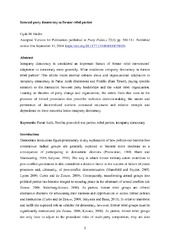Internal party democracy in former rebel parties
Peer reviewed, Journal article
Accepted version
Permanent lenke
https://hdl.handle.net/1956/19874Utgivelsesdato
2016Metadata
Vis full innførselSamlinger
Originalversjon
https://doi.org/10.1177/1354068814550436Sammendrag
Intraparty democracy is considered an important feature of former rebel movements’ adaptation to democracy more generally. What conditions intraparty democracy in former rebel parties? This article traces internal debates about and organizational adaptation to intraparty democracy in Partai Aceh (Indonesia) and Fretilin (East Timor), paying specific attention to the interaction between party leaderships and the wider rebel organization. Leaning on theories of party change and organization, the article finds that even in the presence of formal procedures that prescribe inclusive decision-making, the nature and persistence of decentralized wartime command structures and relative strength and dependence on these networks limits intraparty democracy.
Utgiver
SageTidsskrift
Party PoliticsOpphavsrett
Copyright 2014 The Author(s)Beslektede innførsler
Viser innførsler beslektet ved tittel, forfatter og emneord.
-
Party Competition as an Explanation for New Parties’ Decision to Reenter Elections and Electoral Success: A Heckman’s Selection Model of New Parties in Central and Eastern Europe
Baumann, Sofie Hillestad (Master thesis, 2020-08-28)This thesis investigates the determinants of reentry and electoral success among new parties that encounter ideological competition from established parties in Central and Eastern Europe. In this part of Europe there is a ... -
Should the Norwegian Progress Party be considered as members of the Populist Radical Right Party Family? A Qualitative Analysis of the Authoritarian, Nativist and Populist Elements in the Norwegian Progress Party
Wergeland, Carl Fredrik Storm (Master thesis, 2021-07-02)This thesis started with a simple question that teased my interest, does Norway have a populist radical right party? Most European countries do, and the literature was unclear as to whether the Norwegian Progress Party ... -
Anti-Corruption Parties in the CEE. The Causal Effect of Anti-Corruption Party. Success on Established Parties’ Salience Shifts. A Regression Discontinuity Approach
Lynngård, Juni Maria Jebsen (Master thesis, 2020-08-28)
